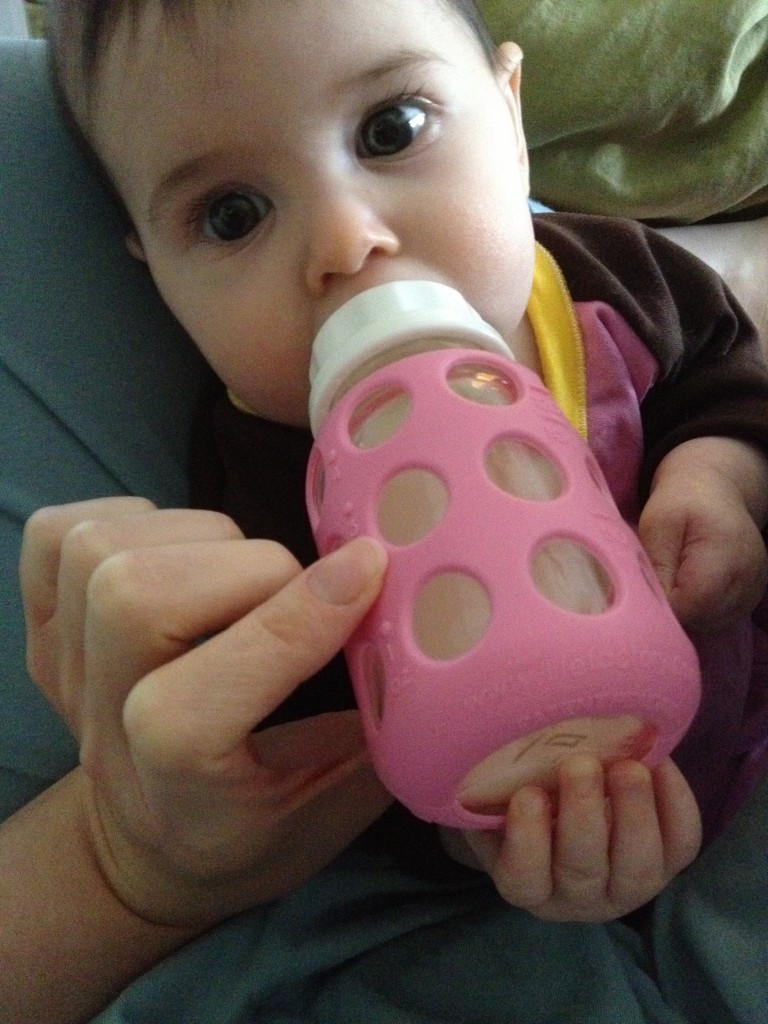
Bottlefeeding: I bottlefed with both pumped milk and formula. Whatever what was in the bottle — I fed it with love.
I’ll give you a moment to finish your gasping at the blog title. But I’m going to get real in this post. I know there are lots of people who think that everyone who provides professional or peer lactation support is a “breastfeeding nazi” and will only support those who are 100% providing milk. What I’m about to tell you represents my experience and breastfeeding struggle, which — even for my IBCLC who had been working with families for over 30 years — represented some unique challenges. Please do not leave this post thinking that this experience represents typical, middle-of-the-road breastfeeding issues, because it doesn’t. My story is fairly extreme. I share it because it was my inspiration for becoming a lactation professional — and for offering supportive and judgment-free assistance to all families.
I intended to exclusively breastfeed. But at 10 days old, when my daughter had lost nearly 25% of her birth weight and was in danger of being hospitalized, I discovered that though she was “at the breast” she actually wasn’t transferring any milk. (And I do mean zero transfer, as confirmed by two weighted feeds, with an appropriately sensitive scale.)
World Health Organization’s Recommendations for Infant Feeding
- Baby at mother’s breast
- Expressed/pumped milk from the mother fed to baby
- Safe donor milk fed to the baby
- Formula/Artificial Infant Milk (called AIM in WHO literature)
There was no time to do anything but try formula if we wanted to avoid the hospital, even though formula is last on the World Health Organization’s list of options for feeding a baby (see at right for the WHO Recommendations for Infant Feeding list). And, in the meantime, my supply was very low and I needed time to build it back up.
So, I rented a hospital-grade pump and pumped like there was no tomorrow. Whatever my daughter needed that I couldn’t pump then came from a can. We found out that she had a tongue tie, not the classic kind that you can see, but a posterior tie, the kind that only those who know what they are looking for can find.
We needed time…
…time to build my supply, time to see one specialist, then another, then another, and yet another then repeat visits back to those specialists — the IBCLC, the chiropractor, the physician, the massage therapist, the other physician. All of it took time — time to get an appointment booked, time to wait for the appointment, time to see if what was done at the appointment worked, time to find out what to try next.
And the whole time I was pumping because my daughter’s “latch” had gone from nonexistent to sucking like a shop vac with a wire bristle attachment and I couldn’t handle the pain. I was committed to providing breast milk and, for the most part, I did. But there were times that I just couldn’t produce enough. Pumps are less effective at removing milk from a breast than a baby with good latch. And to boot, my body didn’t work well with the most commonly available pump. Double-whammy. Then I went back to work. Triple-whammy. I tried my damnedest to keep up with my baby’s needs. But we always had to keep a can of formula around, just in case.

This is not to trivialize the struggles of breastfeeding. I just use humor to get me through tough times.
I dealt with all kinds of emotions, sadness, guilt, jealousy, and sometimes even a little bit of pride that, despite the odds I still managed to be committed to doing whatever I needed to in order to provide as much breastmilk as possible, even if I couldn’t provide as much as my daughter needed.
I had a love-hate relationship with formula and my breast pump. It was the best of times, it was the worst of times.
And then, the clouds parted
After having one of the more difficult cases my lactation consultant had ever seen, I emerged on the other side of ties and pumping, with a child feeding at my breast, finally, after 7+ long months, with a strength and conviction I hadn’t known I possessed, and a passion for helping other families without judgment. Because at the end of the day, we need to feed our babies. Period.
If you’d like to hear more about our journey, I was interviewed for Breastfeeding Outside the Box, a podcast dedicated to all aspects of breastfeeding, especially those that are not well-known. Episode 9 (Part 1 of my interview), focuses on our early breastfeeding journey and challenges: extreme weight loss, rebuilding my supply, exclusively pumping. Episode 11 (Part 2) is about getting my baby back to the breast months later.
What I promise my clients
I may offer evidence-based information about formula vs. breastfeeding, but this is done without any judgment or expectation about your decision. It is simply my professional responsibility to share evidence-based information regarding formula feeding that, quite frankly, formula companies often try to bury, subvert or spin. I do this because it is your right and your responsibility to to make informed decisions about feeding options, and you can’t make an informed decision without knowing all the info. Or I may offer alternatives of how to adjust a method, a routine, etc., so that maybe it’s easier for you to incorporate caring for and feeding an infant while trying to make sure you get food and water, some sleep… and maybe even a shower.
There is no room for judgment or shaming in lactation counseling. And in the end, whatever informed decision you make after carefully considering all your options and the information, I will help support you.
It’s one reason why I ask in my intake paperwork for a summary of a family’s goals for feeding their infant: so I can meet their goals, not mine.
Never hesitate to contact me thinking I will “scold” a formula-using family. Any milk you can give your infant is a gift. But, neither is your milk the sum total of your worth as a mother/parent. Your love is much more important. And you can feed with love, regardless of what’s filling your baby’s tummy.

 Email
Email
Thank you for this! My son did not latch for six weeks due to his ties and needing chiropractic adjustments. I feel this so much, mama. My supply was/is super lower so we’ve supplemented almost from day one. Our journey has led me to want to be an CLC to help other women in the same position. Thank you for writing about this struggle.